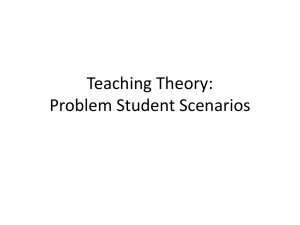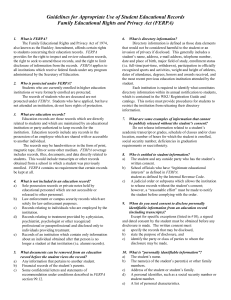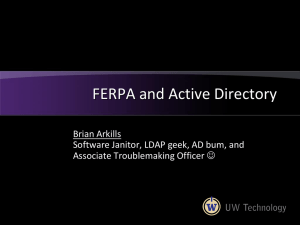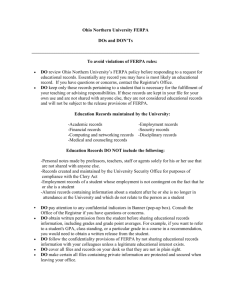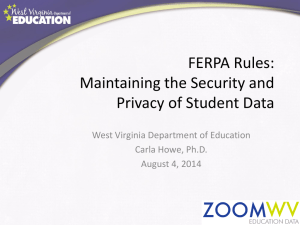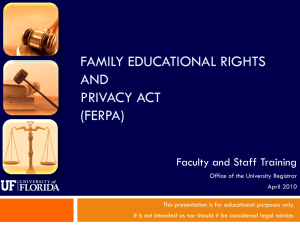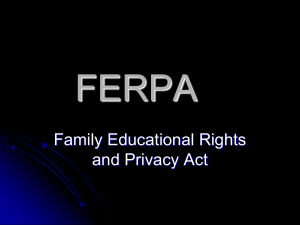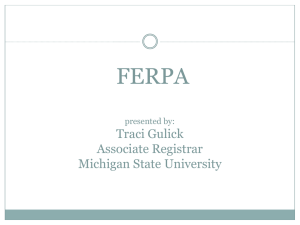FERPA Employee Tutorial – Answer Key
advertisement
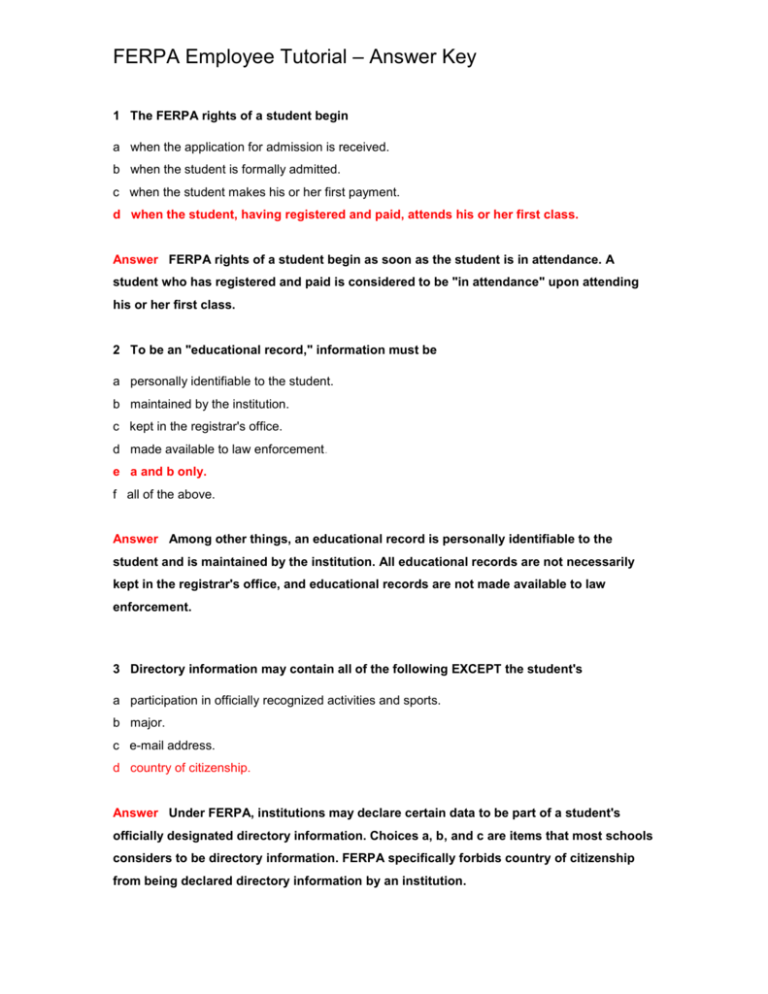
FERPA Employee Tutorial – Answer Key 1 The FERPA rights of a student begin a when the application for admission is received. b when the student is formally admitted. c when the student makes his or her first payment. d when the student, having registered and paid, attends his or her first class. Answer FERPA rights of a student begin as soon as the student is in attendance. A student who has registered and paid is considered to be "in attendance" upon attending his or her first class. 2 To be an "educational record," information must be a personally identifiable to the student. b maintained by the institution. c kept in the registrar's office. d made available to law enforcement. e a and b only. f all of the above. Answer Among other things, an educational record is personally identifiable to the student and is maintained by the institution. All educational records are not necessarily kept in the registrar's office, and educational records are not made available to law enforcement. 3 Directory information may contain all of the following EXCEPT the student's a participation in officially recognized activities and sports. b major. c e-mail address. d country of citizenship. Answer Under FERPA, institutions may declare certain data to be part of a student's officially designated directory information. Choices a, b, and c are items that most schools considers to be directory information. FERPA specifically forbids country of citizenship from being declared directory information by an institution. 4 You receive a phone call asking you to verify (1) that a student is currently enrolled, (2) his address at the time of attendance, (3) his date of birth, and (4) his GPA. According to FERPA, you may verify all of these except the student's: a attendance at the institution. b GPA. c address at the time of attendance. d date of birth. Answer Release of the student's GPA without the student's express, written permission is forbidden under FERPA. A student's dates of attendance, date of birth, and address on file with the University are all considered directory information by most schools. Directory information may be released to third parties unless the student has restricted his or her directory information with the institution. 5 Under FERPA, students may request that institutions not disclose which of the following about them a directory information b non-directory information c both directory information and non-directory information d incidental information e educational record information Answer When a student restricts his or her record, the University will not disclose the student's directory information. The restriction remains in effect until revoked by the student. 6 At the college level, FERPA states that parents a have the same rights of access and review as their child. b may see their child's records only after receiving permission from the dean of students (or designee). c may review progress reports and grades sent directly to the student's permanent home address. d none of the above. Answer When a student begins attending a postsecondary institution, FERPA rights no longer automatically extend to the parents. This is the case regardless of the student's age. The dean of students (or designee) may not assign FERPA rights; only the owner of the records (the student) may give permission to the parents. Regardless of where progress reports and grades are sent, they are still confidential records, intended for delivery to the student. Without the authorization of the student, parents do not have FERPA rights to review these records. 7 A faculty member asks a member of your staff for the names of all of the graduates with a B average in his program since its beginning in 1980. Which of the following statements is true? a The faculty member may legally obtain this information under FERPA, as long as he has written permission from the dean (or designee). b The faculty member may not legally obtain this information, since it is excluded from FERPA. c The faculty member must provide a valid reason for obtaining the information. d The faculty member is not entitled to all of the information, since FERPA does not permit release of this information on students not currently attending the institution. 8 The previous question is an example of the exercise of a legitimate educational interest b eminent domain. c permissible exclusion. d informational exclusivity. e nondisclosure. f implied consent. Answer Faculty members do not have access to student academic records unless their normal job duties specifically require access. This type of access is termed "legitimate educational interest." 9 To encourage communication among students in a course, an instructor can create a publicly accessible Web site with information such as student names, addresses, e-mail addresses, and telephone numbers. In order to be compliant with FERPA, the instructor must a not include information regarding enrollment in specific classes. b make sure that none of the students have restricted the release of their directory information. c obtain written permission from each student in the course. d a and b Answer Because student names, addresses, e-mail addresses, and telephone listings are considered directory information, the instructor must make sure that none of the students have restricted the release of their directory information in order to be compliant with FERPA. Furthermore, the instructor may not group the student information in any way that would reveal non-directory information, such as by class. 10 Under FERPA, which of the following would not be acceptable a The release of the title of a congressman's degree to the local papers. b A faculty member allowing his or her students to pick up their graded term papers from the chair outside the office. c The provost having access to all students' educational records if a specific job-related need arises. d Notifying students of their FERPA rights in the student handbook. Answer Degree information may be released without prior approval, provided that the individual has not restricted his or her record, because most schools have identified it as directory information. The provost has a legitimate educational interest that allows access to all student records. FERPA requires the University to notify students of their FERPA rights annually, and the General Information catalog, published annually, includes that notification. Faculty members may not leave graded papers outside of their offices; under FERPA, faculty members must protect the privacy of students' graded assignments. 11 It is permissible for an instructor to post student grades on an office door if only students' social security numbers are used. a True b False Answer A student's social security number is confidential information. Grades may not be posted using any portion of the social security number or any other personally identifiable information. 12 The student scholarship chair of a fraternity has asked that you provide the grade point averages for all members in order that scholarships and academic honors can be awarded. This information may be provided. a True b False Answer The student scholarship chair for a fraternity is not an "University official" and therefore may not have access to grade point averages of fraternity members. Each member must sign a written release form to authorize the disclosure of their grade point average. 13 Under FERPA, an institution is required to release directory information to all inquiring parties. a True b False Answer According to FERPA, an institution MAY release directory information, but there is no obligation to do so. When in doubt, to avoid noncompliance, do not release information. 14 What are the implications of a student restricting his or her directory information? a All inquiries about the student will be answered with the statement, "I have no information to provide about that individual." b The student will no longer receive electronic junk mail. c The student will have to provide a written release of information in order to give permission to an agency to access directory information. d all of the above e a and c only Answer Students who restrict their directory information should understand that all third parties will be denied access to their directory information unless the student has provided express written permission. 15 You receive a phone call from excited parents saying that there is a family emergency, and they need to get in touch with their daughter immediately. Can you tell the parents the day, time, and location of their daughter's class? a Yes b No Answer A student's class schedule is not a directory information item, so this information may not be released. The parents presented the situation as a FAMILY emergency. FERPA states that non-directory information may be released if "necessary to protect the health or safety of the student or other individuals." In this case the health and safety of the student is not at risk, nor is the health and safety of others contingent upon the disclosure of confidential information about the student.
